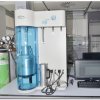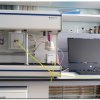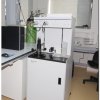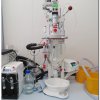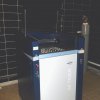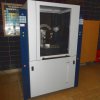Autoclaves
They are with teflon lining to make possible synthesis requiring corrosive media (e.g. zeolites). Apart from the small reactors (100 ml), the key equipments are the large stirred autoclaves (1 l and 5 l) that are used to scale-up the synthesis procedures. The autoclaves can be heated up to 200 °C (1 l) or 350 °C (5 l) and the pressure limit is 2.5 MPa. In this way, up to 100-150 or 500-750 g of zeolite catalyst can be obtained from one batch. In addition, the syntheses can be further scaled up in a 50 l stirred stainless steel reactor that can be heated up to 150 °C and operated at pressures up to 2.5 MPa. The filtered catalyst can be spray-dried in an oven to obtain fine catalyst powder (< 30 microns).
Precipitation apparatus
It allows synthesis of catalysts by the precipitation method (1 to 5 l). The catalysts can be prepared from up to 2 solutions of precursors (liquid feeds up to 1 l/h) and 1 gas feed. The set-up is equipped with temperature (5 to 120 °C) and stirring (50-250 r/min) control and the addition of the solutions can be controlled by the pH measurement (i.e. precipitation is performed at constant pre-set pH value). The apparatus is equipped with pressure filtration of the precipitate.
In-house characterization techniques
The various techniques will provide immediate feedback on the catalyst preparation. These include determination of the structure (by XRD), chemical composition (XRF) and textural properties (i.e. BET surface area by N2 physisorption, Quantachrom AutoSorb iQ, Hg porosimetry, Micromeritics AutoPore IV 9510). In addition other methods describing the reducibility of the active phase, its dispersion or the acidity of the catalyst can be determined by TPD and chemisorption measurements, respectively (Micromeritics AutoChem 3950HP) to allow optimization of the synthesis procedures.


